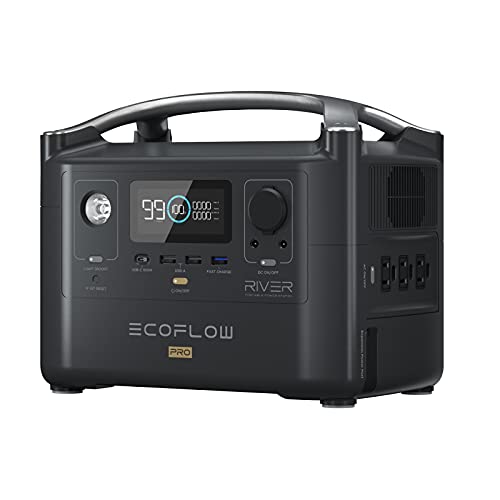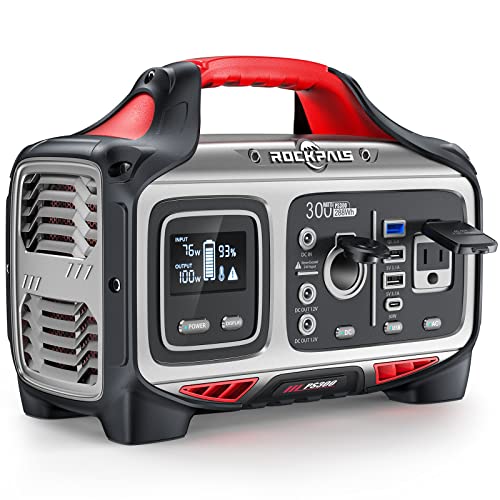Best Portable Generators For Camping For 2024
Gretchen Rubin Apr 19, 2024 7:37 PM
The convenience of portable generators means you may transport your RV to areas without electricity or power your camping electronics while under canvas. Having a movie night in the woods is a fun concept, and with the help of generators, it's completely feasible.
Looking at the prices of several generators might make the chore of selecting the best one seem overwhelming. However, there are a number of other considerations that should not be overlooked. Knowing what you need before shopping for a portable generator for camping and comparing models within your budget will make the process much less stressful.

Compare Products
Last update on 2024-04-19 / Affiliate links / Images, Product Titles, and Product Highlights from Amazon Product Advertising API
Types of generators for camping
Fuel-burning generators
Since 1884, humans have been able to turn combustible fuel into electricity. The majority of campers today use gas, diesel, or propane lanterns, yet 22 percent of America's electricity still comes from coal. There are several reasons why generators that use fuel to produce electricity are still in use today. To begin with, there is an abundance of low-cost combustible fuel options. A gas-powered generator may be kept running for several hours on just a few dollars' worth of fuel. Modern internal combustion engines are very dependable, and refueling your generator only takes a few seconds.
On the other hand, many people are put off by the idea of heading out into the wilderness to start up a loud, exhaust-belching generator. When using a generator that runs on fuel, you'll need to lug around a large amount of heavy, perhaps greasy fuel. The advantages outweigh the disadvantages if you require a great deal of power with almost no downtime. If not, the following section could have what you're looking for.
Solar generators
The efficiency and portability of solar generators have increased thanks to technical developments, contributing to a surge in their popularity. Solar energy banks can draw power straight from the sun, unlike fuel-burning generators, and are notably quieter (or silent) than their traditional counterparts. Off-grid preppers and eco-conscious campers both love them.
The length of time needed to recharge the battery is the primary downside of solar generators. In place of the few seconds it takes to pour petrol into a tank, you'll need a number of hours of strong sunlight and some really pricey solar panels. A solar generator is the greatest option for camping when there is plenty of sunlight and time to wait.
Power banks
Large generators are ideal for journeys with an overland vehicle, RV, or boat, but are too cumbersome and bulky to bring on a backpacking trip or in a boat. You can't afford to bring anything more than a power bank if you're counting ounces.
The Goal Zero Venture 75 and the Anker PowerCore III are great options for short-term emergencies. With careful battery use, these high-quality power banks can keep your phone and other rechargeable devices like a flashlight, GPS watch, etc. charged for several days. Those who plan to be out for extended periods of time may wish to consider solar power banks like the Blavor because of its built-in solar panels.
Noise
Because of the nature of the outdoors, the noise from some generators can go quite a distance. The decibel scale is often used to quantify the loudness of a sound (or dBA). Two persons can carry on a normal discussion at a loudness of around 60 dBA. Surprisingly, many portable generators may be configured to emit no more than 60 dBA of noise when placed 20 feet away from the unit. Some versions of generators are fueled by the sun or other renewable sources of energy and can operate quietly.
Output power
A small generator will do for tent camping, but a generator of 2500 watts or more will be required to run the appliances in a recreational vehicle.
Knowing the starting and running wattage of your most often used equipment is essential for using your portable generator effectively.
A motor home's central air conditioner often uses the most energy. Power consumption for a 7,000 BTU air conditioner is typically between 1700 and 1800 watts during startup and 600 to 650 watts once running. An RV air conditioner with 15,000 BTUs might draw up to 3,500 watts of power to kick on.
Weight
Most generators weigh quite a bit. While smaller generators (40 pounds or less) exist, those requiring 3000 beginning watts or more may end up with units weighing 100 pounds or more. To accommodate a smaller machine, you may need to reduce the number of appliances you use or stick to using just one.
Portability
A larger and bigger generator is inevitable when dealing with increased power. You can find highly effective lightweight solutions, but they typically come at a hefty premium. Evaluate how much juice you truly need. You must also plan how you will transport the generator from point A to point B.
Having an RV with tons of storage room makes this less of a concern, but if you'll be vehicle camping, have limited storage space at home, or detest carrying heavy goods about, this becomes more of a necessity.
Fuel/Charging
Powering your generator can be done in a number of different ways, and this can be a deal breaker for some. Generators that run on gasoline or propane have the advantage of being portable, while generators that run on electricity are less expensive and solar generators can come in handy in a pinch.
There are benefits to each, but the most important considerations will be how far away from civilization you plan to camp and how much room you have for backup fuel.
Power reserve
Wattage is used to categorize different types of generators. It doesn't matter what fuel is used to run a generator, because you'll still be using electricity. Look at the product label to see if it specifies the amount of power that the device consumes (both in constant operation and during startup). A camping generator's ideal size can be determined by adding up the total power draw.
Portable camping generators may have an output of 1,000 watts or less. They are ideal for portable electronics including cell phones, GPS units, torches, cameras, notebook computers, and wireless speakers. Power tools, fans, heaters, and lights may all be run off of a 2,000-watt camping generator. Look for a generator with a rating of 6,000 watt-hours or more if you plan on running high-consumption home appliances like a refrigerator and microwave.
Convenience features
Many companies strive to sell the greatest camping generators on the market, so to stand out from the crowd, they include features that customers see as valuable. While you may not care about all of these options, others may be crucial.
Charge your devices with ease by finding multiple docking stations; options include 120-volt and 12-volt outlets and USB ports of varying sizes are prevalent. A 240-volt plug may be standard on larger generators intended for use at more developed campgrounds. It is possible to expand the storage capacity of some solar generators by connecting them in a series with more batteries. Modern inverter generators are able to vary engine speed to meet power needs while minimizing fuel use.
FAQS
Why would you need a generator while camping?
Coolers, barbecues, lights, fans, and heaters are just some of the camping conveniences that can be powered by generators. Power banks will have to do for backpackers, but generators are a game-changer for those camping in cars or RVs.
What size generator do I need for camping?
That's totally variable based on your energy consumption habits. If you want to avoid having to replace an outlet prematurely, it's a good idea to calculate the total power usage of everything you intend to plug in and then adjust accordingly. Consider how readily available fuel and solar power will be.
What’s the difference between inverter generators and portable generators?
Because of their ability to vary engine speed in response to electricity demand, inverter generators are more fuel-efficient. Portable generators of the past all maintained a steady engine speed, which made them incredibly reliable but also very noisy and fuel-intensive.
How much does a portable generator cost?
A generator with a starting wattage of 1200-2400 will run you between $350-$600. Costing $800 or more, a generator with 3000-3500 starting watts is not cheap.
Conclusion
After today's discussion of numerous portable generators, you may be asking which one is best for your camping needs. There doesn't matter much which generator you get as long as it is an inverter. The perfect generator would meet all of your needs while staying inside your price range. I guarantee you'll always wish you had more authority than you do, but never less.
If you want to buy the best camping/RV generator for your needs, you need to do some research. Knowing your options and the distinctions between the various generator types is crucial. It is vital to know the local rules before arriving at a campground, as they may have strict noise restrictions. If you're camping in close proximity to other people, you won't have to worry about annoying them with the noise from any of the generators recommended here.
I'll say it again: the only downside to a battery generator is the price. A silent, lightweight, parallel-capable, and less expensive alternative to a battery backup is an inverter generator, which is ideal for camping. That's up to you to decide.



















